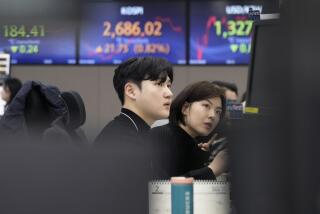Stocks rise broadly as investors regain some optimism
- Share via
Stocks on Wall Street closed broadly higher Wednesday, clawing back all their losses from the previous day and extending their strong gains for the week.
The Standard & Poor’s 500 index rose 1.7% as the market bounced back from Tuesday’s sudden drop. Crude oil prices posted their fifth straight gain.
Technology, the only sector that’s holding on to a gain for the year, accounted for much of the market’s upward move. Communications companies and banks also helped drive the market higher. Major stock indexes in Europe and Asia also finished higher. Bond yields fell, a sign of caution in the market.
Fresh hope about a potential vaccine for COVID-19 has spurred stocks higher this week, as has optimism that the U.S. economy will recover in the second half of the year as businesses gradually reopen and stay-at-home orders, aimed at stemming the spread of the coronavirus, are relaxed.
“This is very cautious optimism,” said J.J. Kinahan, chief strategist with TD Ameritrade. “You’re seeing people also buy bonds today. That’s very surprising, seeing the stock market doing well and also seeing people buy bonds.”
The S&P 500 gained 48.67 points to 2,971.61. The Dow Jones industrial average rose 369.04 points, or 1.5%, to 24,575.90. The Nasdaq composite, which is heavily weighted with technology stocks, climbed 190.67 points, or 2.1%, to 9,375.78. Small-company stocks did even better, sending the Russell 2000 index up 39.21 points, or 3%, to 1,346.93.
With the gains this week, the S&P 500 has recouped its losses from last week and is on track for its biggest weekly gain since early April. The index is still down about 12% from the all-time high it set in February.
Investors are betting that the economy and corporate profits will begin to recover as the U.S. and countries around the world slowly reopen. However, concerns remain that people venturing out could lead to another surge in infections, potentially ushering in another wave of shutdowns.
“What it all comes down to is consumer spending,” said Scott Wren, senior global market strategist at Wells Fargo Investment Institute. “If we’re all still sitting home in September or October, the market is going to go lower.”
The market is getting some insight into how companies are navigating the economic fallout from the coronavirus crisis this week as several retailers report quarterly results. Lowe’s and Target, which benefited from people stocking up on supplies at the stores and online during the coronavirus lockdown, posted results that topped Wall Street’s forecasts. They also reported a sharp increase in costs related to the pandemic.
After rising initially, shares of both companies fell as some traders questioned whether the retailers’ results will weaken as the economy opens up and people have more shopping options. Lowe’s closed up only 0.1%. Target fell 2.9%.
Wall Street also hammered Royal Caribbean after the cruise line operator said it booked a $1.4-billion quarterly loss as it was forced to suspend operations because of the pandemic. Its stock briefly climbed after the company said bookings for 2021 are within historical ranges, but then closed 3.4% lower.
Oil prices, which have nearly doubled since late April, continued to climb. Benchmark U.S. crude for July delivery rose $1.53, or 4.8%, to settle at $33.49 a barrel. Brent crude oil, the international standard, for July rose $1.10, or 3.2%, to close at $35.75 a barrel.
The price of oil has made a comeback this month as oil-producing nations cut back on output and the gradual reopening of economies around the globe have driven up demand. Crude oil started the year at about $60 a barrel, but plummeted as demand sank because of widespread travel and business shutdowns related to the coronavirus.
Bonds yields were mostly lower. The yield on the 10-year Treasury note, a benchmark for interest rates on many consumer loans, fell to 0.68% from 0.71%.
More to Read
Inside the business of entertainment
The Wide Shot brings you news, analysis and insights on everything from streaming wars to production — and what it all means for the future.
You may occasionally receive promotional content from the Los Angeles Times.










